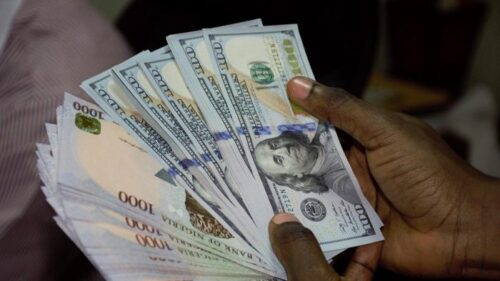The naira surged to its strongest level in eight months, hitting ₦1,474.78/$ at the official foreign exchange (FX) market on Friday. This appreciation comes on the back of declining demand for the dollar, fueled by a mix of fiscal and monetary reforms rolled out by the Nigerian government.
In comparison, the naira was trading at ₦1,485.99/$ on June 3, 2024, showing notable recovery over the past eight months. This rebound is attributed to a combination of factors, including increased domestic petrol refining capacity, a steady flow of foreign currency inflows, and proactive policy interventions by the Central Bank of Nigeria (CBN).
Key Drivers Behind the Naira’s Strength
One major catalyst for the naira’s upward trajectory is the start of operations at the Dangote Petroleum Refinery, which began refining petrol in September 2024. With a capacity of 650,000 barrels per day, the refinery has significantly reduced Nigeria’s reliance on imported fuel, easing pressure on the FX market.
Just four months after Dangote’s operations commenced, Nigeria’s petrol imports dropped to their lowest level in eight years. Data from Vortexa Ltd, an energy analytics firm, revealed that petrol imports stood at around 110,000 barrels per day between January 1 and 24, 2025.
According to a report by PwC, petrol imports previously accounted for 22%–25% of Nigeria’s foreign exchange demand. By slashing import volumes, Nigeria has substantially reduced its need for dollars to pay for fuel, contributing to the naira’s strength.
“With fewer fuel importers seeking dollars, the market pressure has eased. Additionally, the CBN’s clearance of forex backlogs and inflows from Eurobond issuances have supported this positive trend,” said Ike Ibeabuchi, an emerging markets analyst.
Decline in Dollar Demand Across the Economy
Foreign exchange (FX) utilization across various sectors of Nigeria’s economy dropped by 11% in the third quarter of 2024, falling to $5.7 billion from $6.4 billion in the second quarter. This reduction was largely driven by decreased demand for FX in invisible transactions—non-physical goods like services, remittances, and other financial transfers.
Uche Uwaleke, Director of the Institute of Capital Market Studies at Nasarawa State University, remains optimistic about the naira’s prospects for 2025. He attributes the currency’s positive outlook to reduced petrol and food imports and the potential growth of fuel exports.
“The expansion of domestic refining capacity will lead to a sharp decline in fuel imports, easing pressure on forex demand and strengthening the naira,” Uwaleke explained.
“Additionally, as Nigeria increases its export capacity, foreign exchange inflows will rise, providing further support for the naira,” he added.
The Impact of Stronger Foreign Inflows

Nigeria witnessed a remarkable surge in foreign exchange inflows during the first quarter of 2024, with total inflows reaching 136% of the amount recorded in 2023. A significant portion of this came from Nigeria’s dollar bond issuance, where the government raised over $900 million in what was considered a milestone transaction.
In December 2024, the federal government launched a dual-tranche Eurobond offering under its Global Medium Term Note Programme to finance the 2024 budget deficit. The Eurobond issuance included:
- A 6.5-year bond with a 10.125% coupon rate
- A 10-year bond offering a 10.625% coupon rate
Wale Edun, Nigeria’s Minister of Finance, noted that this move was part of a broader strategy to complete the government’s external borrowing plans for the year.
“The goal is to secure a $2.2 billion financing package, which includes $1.7 billion from the Eurobond market and $500 million from Sukuk bonds,” Edun said.
CBN’s Bold Policy Moves Paying Off
Following Thursday’s trading session, the naira gained 1.67%, appreciating by ₦24.8 against the dollar. It closed at ₦1,485.95/$, up from ₦1,510.72/$ the previous day, according to data from FMDQ Securities Exchange Limited.
On the official market, authorized dealers quoted the dollar as high as ₦1,516/$ and as low as ₦1,470/$. Meanwhile, the naira also strengthened in the parallel (black) market, appreciating by ₦15, with the dollar trading at ₦1,620/$ on Friday compared to ₦1,635/$ on Thursday.
The CBN’s introduction of the Electronic Foreign Exchange Matching System (EFEMS) in December 2024 has brought greater transparency to FX transactions. Additionally, the release of a new Foreign Exchange (FX) Code aims to enhance market liquidity and establish clear guidelines for FX market participants.
“The CBN’s focus is on restoring order in the foreign exchange market. Over the years, unchecked practices have destabilized the system, but these reforms are already yielding results,” said Muda Yusuf, CEO of the Centre for the Promotion of Private Enterprise (CPPE).
“The more we can clean up the FX market, the greater the stability we’ll achieve,” he added.
What Lies Ahead for the Naira?
With reduced demand for imported fuel, increased FX inflows from bond issuances, and strategic CBN reforms, the naira is on a promising path. Analysts expect these trends to continue, bolstered by:
- Stronger domestic production reducing import dependency
- Sustained foreign investment inflows
- Continued FX market reforms ensuring transparency and stability
While challenges like inflation and global economic uncertainties remain, Nigeria’s proactive policy shifts are setting the stage for a more resilient and stable currency in 2025. Investors and market watchers will be keeping a close eye on how these dynamics evolve in the coming months.


